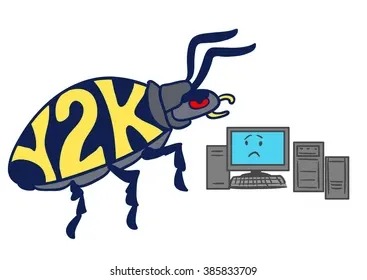The Millenium Bug

The Millennium Bug, also known as the Year 2000 problem or Y2K, was a collective fear that computer systems would not be able to handle the change from 1999 to 2000 due to the way dates were stored, using only two digits (e.g., 99 for 1999). This could lead to system and service failures worldwide. The “Bug” or problem – since in computer science bug was a term for when computers were these massive structures and had to have perfect conditions to handle things properly whereas a single bug could disrupt the machine’s state and calculations, now back to the topic – was that many systems used only two digits to represent the year (e.g., 99 instead of 1999) to save storage space. The concern was that, when the year 2000 arrived, computers would interpret "00" as 1900, causing errors and disruptions in various areas, such as banking systems, transportation, communications, and other essential services.

Due to the panic, this solution was implemented: Companies and governments invested billions of dollars in updates and fixes to avoid chaos. Programmers and technicians worked at a rapid pace to adapt systems and avoid problems at the turn of the millennium. But what really happened was that, in practice, the Y2K bug didn't cause the expected catastrophe. There were some isolated failures, such as at bus terminals in Australia and measuring equipment in Japan, but most systems worked properly. The successful resolution of the problem was the result of a global prevention and remediation effort.
What can we learn from this is:
The Y2K bug taught some important lessons, such as the need to plan and invest in technology, the importance of collaboration between different sectors, and awareness of the risks of computer system failures. But there are other bugs in the future ahead of us, as computation is not entirely perfect: So It's important to emphasize that date-related problems still exist in computer systems. The so-called "2038 Y2K bug," or Y2038, linked to the time standard in Unix systems, could affect systems using 32-bit systems starting in 2038. Again, the expectation is that upgrading to 64-bit systems, which have a much higher limit, will prevent future problems.

Posted Using INLEO

Congratulations @moriame! You have completed the following achievement on the Hive blockchain And have been rewarded with New badge(s)
You can view your badges on your board and compare yourself to others in the Ranking
If you no longer want to receive notifications, reply to this comment with the word
STOP